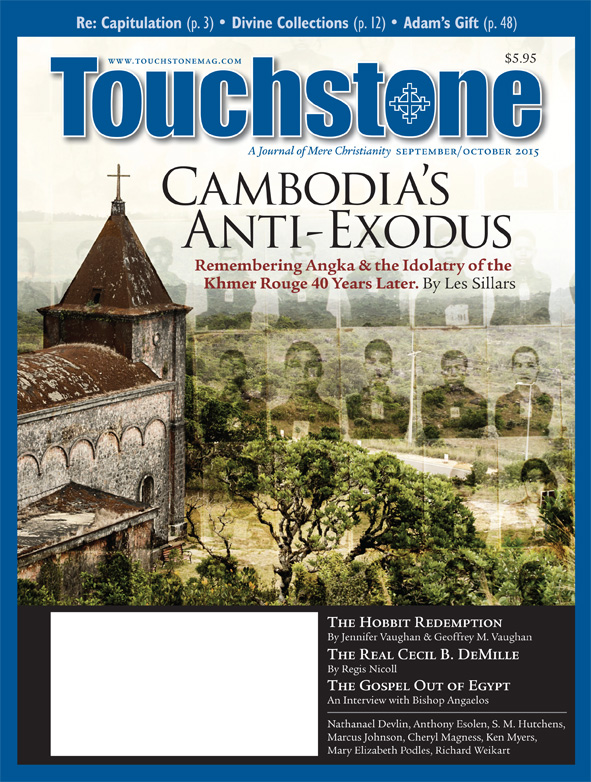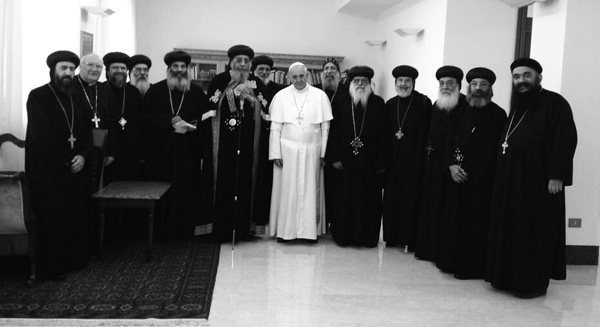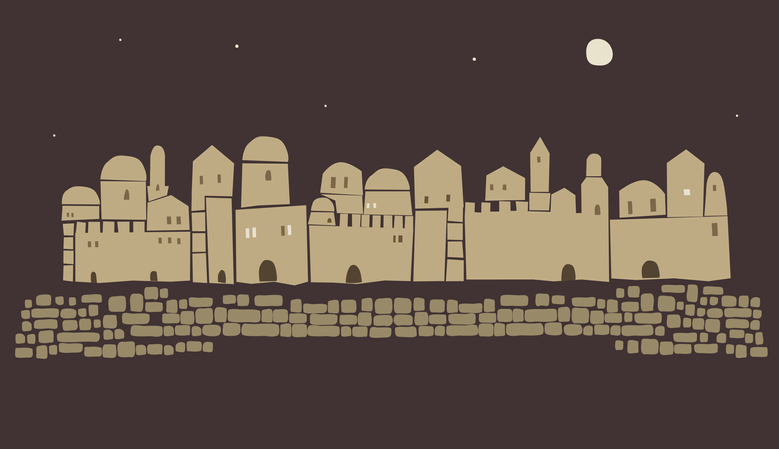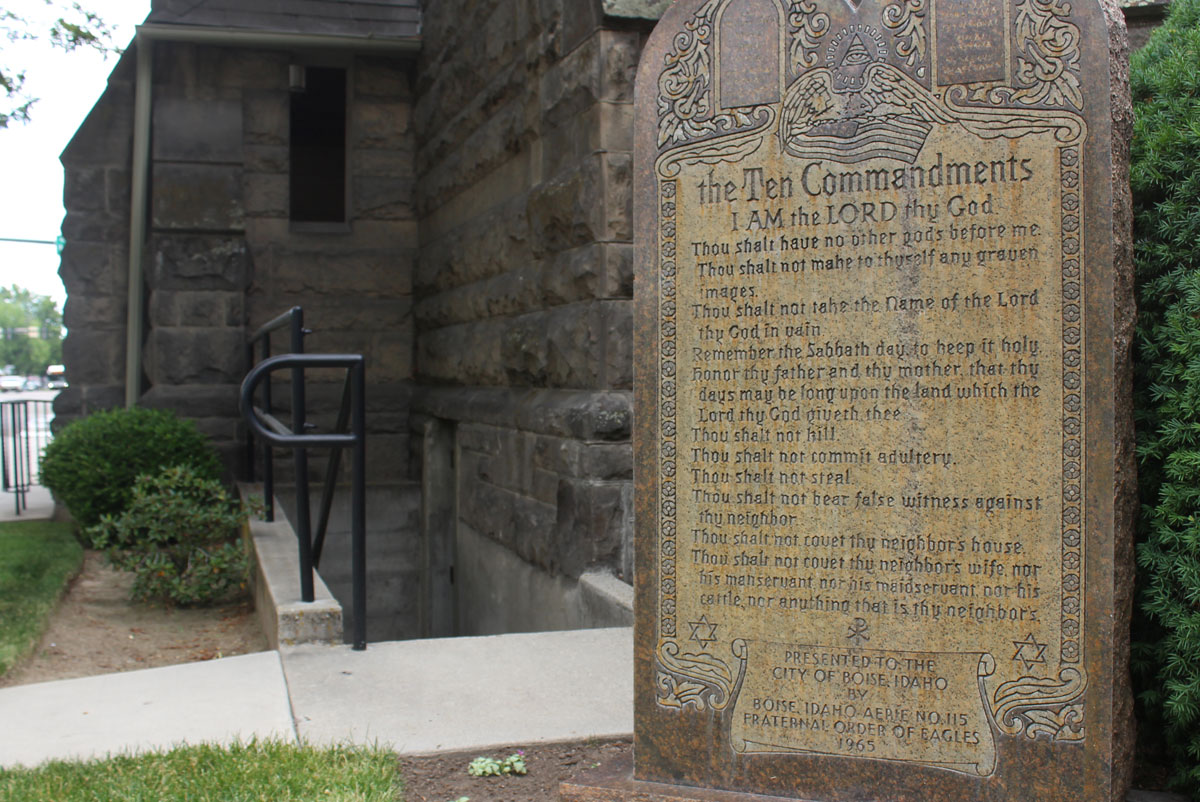Interview
The Gospel
Out of Egypt
Bishop Angaelos of the Coptic Orthodox Church
Bishop Angaelos is General Bishop of the Coptic Orthodox Church in the United Kingdom. He served as private secretary to the late Pope Shenouda until 1995, when he was delegated to serve a parish in the U.K. He was consecrated bishop in 1999 and is active ecumenically at the local, national, and international levels. He travels extensively to speak at various youth conferences and conventions. See www.CopticCentre.com.
The following interview took place during a meeting of the Lausanne-Orthodox Initiative, on September 19, 2014, at St. Vlash Monastery, Durres, Albania. Bishop Angaelos is the co-chair of the Lausanne-Orthodox Initiative, "a movement of Orthodox and Evangelical Christians who wish to respect each other's beliefs, learn from each other, and support one another as we each obey the call to share in God's mission" (www.loimission.net).
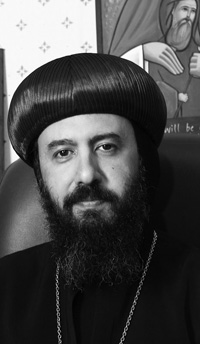
Lausanne-Orthodox Meeting
How did you become involved with the Lausanne-Orthodox Initiative?
I received an invitation from the Lausanne Movement to attend their meeting in Capetown in 2010. It was the first meeting they had had in nearly twenty years.
I arrived late on the first day; sessions had already started, and it had been a long journey to South Africa, so I decided to go and have a cup of coffee. While having my coffee, I noticed two people sitting to my left. They asked who I was and what I was doing there. Obviously, the Lausanne Movement is an Evangelical movement—among 4,000 Evangelicals, I was one of only four Orthodox who were there. So a lot of the people there had never seen an Orthodox clergyman before. They asked who I was—I was dressed in my cassock; within our tradition we're always vested in cassocks. And so we had a conversation.
I received an email inviting me to lunch with them, and so I went and had lunch. There was a session just after that. The session was quite disturbing because it referred to some of the majority Orthodox Eastern European countries as "unreached." I came out of this thinking, "What do you mean by unreached? Christianity has been there for decades and in some cases centuries." We met again, and I flagged this. They were very apologetic and explained that not everyone thought like that, of course.
I was particularly challenged by the fact that in Egypt and other countries there isn't always a healthy relationship between Evangelicals and Orthodox, because Evangelical missions have come into a place like Egypt, where Christianity has existed for two thousand years, and exercised elements of proselytism, where they are preaching to people who are already Christian, rather than preaching to the majority non-Christian population. That has always been a concern of mine because, as you've seen me here [at the consultation], I have very good relationships with non-Orthodox outside of Egypt—but that is the dynamic in Egypt, and the same dynamic exists in lots of other majority Orthodox countries. The relationships are very tense and very unhealthy.
I thought, we need to do something about this. It just so happened that two of the people I was invited to dinner with were Leslie Doll, who is here with us at the consultation, and Grace Matthews, who is also here and was a member of the Lausanne board. I invited them to London to have a conversation. We had a meeting there in January 2011. Leslie and Grace were there, and Mark Oxbrow also, who is based in Oxford. The four of us met and we asked, "What do we do about this?" I am always someone who likes to take the next step. It is not good enough to just meet. So I suggested that we establish an international steering committee to take this forward. We suggested names. Within a few months we had met as an international steering committee. That steering committee met about three times between 2011 and 2012; it planned for our first international consultation in 2013 here in Albania, and now this is our second.
And you hope to have a third, and that may develop into some joint . . .
Well, we do not know where it is going to go. We are definitely having a third. Whether it becomes an annual event or whether it becomes something that turns into a more regional engagement—we are open to that; we are open to where God guides us.
What Is the Coptic Church?
Similar to what you found among the people you met in South Africa, few of our readers will have met a Coptic Christian priest or bishop. Perhaps you could explain briefly what the Coptic Church is in relation to or in contrast with other branches of Orthodoxy or Western Christianity.
First, "Coptic" simply means Egyptian, and that is what confuses a lot of people. It is much easier being referred to as Greek, Russian, or Serbian Orthodox, because that is what you are. But being Coptic, you always have to explain what "Coptic" means. "Coptic" comes from the Greek word Egyptus, which means Egypt.
Coptic Christianity was established by St. Mark, writer of the second Gospel, when he went to Alexandria in the first century. Christianity spread quite quickly, partly because of the presence of ancient Egyptian culture, which already had the foundations of a triune god in its own pagan deities. Egyptians had the concepts of a higher being, judgment, and an afterlife. So once that was put within a Christian perspective, it was very easy for them to absorb; the foundations were already there. Not only was Egypt a great cultural center, in Alexandria it was also a great philosophical center; it gathered people from all over the world to the great school of Alexandria.
We experienced a significant amount of persecution at various stages in our history, whether it was under Rome or Byzantium or the Turkish presence or with Islam coming in the seventh century. We have faced all of that and also have experienced a significant amount of martyrdom. It has become part of who we are—to the extent that our Coptic calendar starts in the year a.d. 284, the beginning of the reign of Diocletian, because under Diocletian we suffered the greatest amount of persecution and martyrdom. And so our calendar years are numbered from "a.m.," Anno Martyrum, for "Year of the Martyrs." This year is 1731 a.m.
We are a scriptural church, using the Scriptures significantly in everything we do. We are a liturgical church, a sacramental church. We are a traditional church, with our own fathers being St. Anthanasius, St. Cyril of Alexandria, St. Dioscorus—the significant saints who contributed to the life of the church and the ecumenical councils.
One of the major pillars of our church is monasticism, obviously with St. Anthony, the founder of monasticism, having been an Egyptian Christian. And monasticism started in the deserts of Egypt, and from there spread all over the world, whether through St. Benedict or John Cassian or other significant monastic leaders who had come to Egypt to experience it and then spread it.
So we have the monastic movement, and the ecumenical councils with people like St. Athanasius, who contributed significantly to the Athanasian Creed.
And then came the Council of . . .
And then came Chalcedon, unfortunately.
But we won't get into all that.
No, but I would like to get into it in one respect. I believe that through our ecumenical engagement at the moment, we have come to realize now that Chalcedon historically is at best just an issue of semantics and at worst a very bad issue of politics back then, but in actual fact there is not a theological difference at all. We have been accused of being monophysite.
That's not a term that you obviously would use.
Yes, but I mean monophysite in the sense of believing in only one nature of Christ. The question we have always asked is, "Which nature do we deny?"—because our fathers have constantly defended both the humanity of Christ and his divinity, but being incorporated into one indivisible nature, which is the mia physis. Through our own encounters and our own ecumenical engagement at the moment, I am hopeful that we will try to overcome that soon.
Middle East & Democracy
I truly hope so. On a completely different subject: In your HARDtalk interview with the BBC last year, you seemed to suggest that, as a clergyman, as a Christian bishop, you cannot call for military intervention in the Middle East, but you also recognize the legitimacy of military actions taken by secular governments in the West if they are attempting to stop the killing of any citizen—regardless of religious affiliation—and provide security. Is that accurate?
What I actually said was that, without a doubt, war is wasteful and destructive, and must be avoided at all costs. However, countries have armies, and they have military strategies. We should as Christians—as Christian leaders—be a moral compass and try to get people to avoid the taking of life at all costs, but if particular decisions are made, then they are made. We should continue to be a moral compass in that, even if those decisions are made, then we still represent what is right and can always speak for what is right.
What are your thoughts on democracy as a force for good?
The way democracy has been introduced into the Middle East has had an element of arrogance. Democracy is a means to an end; that is all it is. It is a means for securing one's representation, one's rights.
A means to an end . . . but a fallible means?
Absolutely, all you have to do is look around the Middle East to see what a disaster it has been.
Democracy needs two major elements. First of all, it needs viable candidates, who know what democracy is and present a platform, who represent an ideal, and who show people how they are going to arrive at that. Then democracy needs an informed choice. An informed choice means people who are making an informed political choice based on what they have been told and based on their own understanding of what they need and what they want.
Democracy is not something you just want to have in order to prove that you are a developed country. You must have capable leaders who are able to govern, who are competent to arrange for the activities necessary for a functioning state, which first of all is tasked with protecting the peace and well-being of its citizens.
Personal History
You were raised in Australia, and now live in Great Britain, but you were born in the Middle East, in Cairo, to a Coptic family—
Yes, I was born into a practicing Coptic family.
Do you have brothers and sisters?
I have one younger sister.
Why did your family move to Australia?
It was a decision by my father to look for a better life. He decided we would have a better future there. He left about two years before us, and then my mother and sister and I followed him to Australia. I was five when we migrated. We moved straight to Sydney.
What kind of work did your father do?
He was in entrepreneurial work; he was in import and export.
In Australia you studied law. Did you intend to become a lawyer?
Absolutely. I actually practiced for a while. I did a bachelor of arts degree first, and majored in political science, philosophy, and sociology, and sub-majored in psychology. And then I studied law. I was studying law part-time, so I was working through a degree, and before I left Sydney I was running a legal office. So I practiced law for a few years.
So what led you to leave a legal practice in Sydney and to go back to Egypt?
I went back specifically to join the monastery; there was no other reason for it.
Faith & Calling
What led you to desire to join the monastery?
Within our understanding, monasticism is a calling—and so definitely it was a calling. I lived a very normal life. Socially I was very active; I had friends; I was serving in my church. I was serving on our church council, covering the state of New South Wales, as a youth representative.
In retrospect, I think there were beginnings of rumblings of wanting the monastic life.
Were there any particular events or experiences that opened up to you the possibility that you had a calling?
In retrospect, there was one particular incident, and then one memory. The incident was before 1985, I think. We had gone back to Egypt as a family, just for a visit, and I decided to go with my cousin to visit the Monastery of St. Bishoy (Paisius in Greek), where I ended up. It was back when the monasteries were still in very primitive states. It was not the slightest bit comfortable. We had to walk a very long way to get to the monastery. We rode on the back of a pickup truck at the beginning but had to walk the remainder of the way. We got there, and it was not a very comfortable accommodation, but as I walked into the monastery, a monk riding on a tractor just waved at me, and I thought that it was very welcoming. It seemed to touch me, and then being there overnight I thought nothing of it, and I went back and carried on my life as normal.
But I remember the actual time that I decided. I was sitting down doing some reading, continuing my law studies, and I remember, specifically, I was sitting on the floor in my bedroom—and I remember that instant: closing the book, putting it down beside me, and thinking, "That is it. I am going to start to take steps."
Do you recall as a young man specific events or memories where you became aware that God truly exists, and that the One whom we worship in church is alive?
I think there is a particular difference between people who are born into Christianity and people who come into Christianity. I was born into a practicing family where God was always there, where we always went to church. I had an active life in the church as someone who was served through Sunday school, because in the Coptic Church we also had the blessing of having a very active Sunday school movement. So I grew up in that. I served in Sunday school and as a youth servant, so God was always there; there was no one particular incident. I was having a conversation yesterday with one of our Evangelical friends here about the knowledge of God and salvation and the experience of God being an unfolding process rather than an instantaneous happening—I think in my life it has just been unfolding, and it continues to unfold.
Sunday School
I've heard about the Sunday school movement of Coptic Christianity. Can you tell our readers about it?
It started in the 1950s with a very prominent deacon, Habib Girgis. We have just canonized him, so he is now recognized as a saint. He started this movement of Sunday school education, and it spread throughout the church. The late Pope Shenouda was a disciple of Habib Girgis, and he absorbed this very much and carried it on. It has become an intrinsic, entrenched part of who we are. Everyone has come up through Sunday school; it is an active ministry. A significant majority of people, as they come up through the church, go from being served in Sunday school to serving in Sunday school as well, and that also brings on a very significant youth ministry afterwards—and then after that, a young adult ministry. It cascades through generations, and it becomes a very significant part of who everyone is.
So on a typical Sunday, most of the people who attend liturgy would then go to Sunday school?
The children, typically, would all go to Sunday school. There would be a significant proportion of people who would be serving them as Sunday school servants, as facilitators—people who support that ministry in any way, while the parents would have their own adult Bible studies that they would attend. It is important because it carries on this concept of learning.
Sunday in the Parish
For the typical member of your parish in England, what would be the normal Sunday routine and schedule?
In England some people will drive as far as an hour or hour and a half to get to church. The center that has now become my headquarters was my parish. I started as a parish priest, and I made a conscious decision to start the Liturgy at 10:00 a.m. and not earlier because people did drive significant distances, and when they have children, it is just a greater pressure to put on people. They would arrive by 10:00, we would have a Liturgy, typically finish by 12:00, and then have a brunch, which is typical of all Christian parish communities, socially breaking bread after the Eucharist. Then Sunday school would start.
My parish was a bit different, because it was not your typical church. It was on a seven-acre property, with lots of space. After Sunday school, children would play football or different things at the same time their parents were attending Bible studies. It became a very family-orientated event, where people would stay until 3:00, 4:00, even 5:00 in the afternoon, and then leave. One of the reasons for this is that in England our situation is very different from places like the United States or Canada or Australia, where there is a larger immigrant presence. In England, we have a lot of nuclear families, immediate families, so the church community becomes their extended family. So whereas on a Sunday [in the U.S. or Australia] the extended family would gather in the family home, in England there is no extended family, so the church becomes that home.
Is this because many of your people are recent immigrants to England?
No, it is because of our current demographics in England. The vast majority of our people are medics, and they have come to fulfill the membership requirements of the various Royal Colleges. It is different from the U.S., where you can invite aunts, uncles, brothers, sisters, parents to come. You cannot do that in England; you cannot sponsor an extended family to come.
Youth Ministry
You have a very active youth ministry in England. What are some of the main challenges that the youth of your parishes face in England today?
I think it is the same challenge most people would face anywhere in the world: a very aggressive secularism; consumerism; a pressure on time; a difficulty in trying to prioritize properly and give themselves, as individuals or families, sufficient time and opportunity to spiritually engage. People are bombarded, our senses are bombarded; because of social media, because of technology and what we have, we are constantly being approached and fed different things. Our consciousness is constantly penetrated by messages to our phones or our social media feeds or general communication. I think that brings along with it a challenge of trying to focus internally on who we are.
Could you give us an idea of what youth ministry is like among the Coptic Christians of England?
I became a bishop in 1999. As of 2000 I established an umbrella body called Coptic Youth Mission (the website is CopticYouthMission.com), with a view that there needed to be an umbrella under which everything came, and since then we have been developing various programs. So under the Coptic Youth Mission we now have fifteen different youth programs running nationally, from our annual conferences and conventions to our sports ministries to our cultural ministries to our university ministry, outreach ministries, homeless missions—a very broad spectrum. The reason is, my feeling is, that young people are very gifted, and the more we allow them to use those gifts in a productive way, the more they can be engaged. Having such a broad spread means people will engage in different ways and be able to find different things to excel in.
Because of their ethnic background, do the youth feel a pressure to assimilate to whatever the general English culture is—if there even is one?
I do not think we have that struggle. I am very happy with the way the Coptic Christians are in England, because they are assimilated, they are British Copts. We are not an exclusive community. We are very open to engagement, but of course there are challenges. Concepts of sexuality, relationships, morals, ethics—they challenge any person who wants to live as a good practicing Christian. They would be the kind of challenges people would be facing.
Are the worship services in your churches in England in English?
It depends. We are actually quite blessed in the church in that we are not hampered by language. We do not believe in the sanctity of a language. Language is a vehicle. Within our churches, if there is a church that is a majority one way or the other—English-speaking or Arabic-speaking—it goes either way. When we look at our services—some services are fully in English—most services would be at least 50 percent English, if not more.
Life as a Bishop/Monk
I assume that all Coptic bishops are also monks.
Yes. In our tradition, bishops are all originally monks, but of course, as with all the Orthodox churches, our parish priests are married.
How does a monastic life, with its daily rule of prayer, fit in with your very busy life as a bishop?
I am an early riser, so my early-morning hours are mine, before the phone starts to go off, and I start to be contacted. So I try to always have my own personal time in the early morning. As monks, we will always do the midnight praises, as well as our agpeya prayers—the hourly offices. There are seven daily prayers, and there is an additional one just for people in monastic life.
Monastic Life
I understand that the relationship between the Coptic laity and the monasteries is very dynamic. Why is that?
The monasteries have become a haven for many people, I think, because of the persecution they have lived through and the sacredness they bring; they are a refuge. So, yes, the people will visit monasteries regularly, and the way we have set up our monasteries now, the monastic areas are very deep in the heart of the monasteries, and the public areas, where the public can visit, are on the periphery. So you will find monks and novices who are responsible for the people coming in to visit, but those people do not actually go into the monastic area of the monastery. It is a very small proportion of the monks who look after the guests, and the rest of the monks are not affected by that.
So what do the guests typically do at the monastery?
They will often come early in the morning and participate in the liturgical services, the Eucharist. If there are relics of saints in the monastery, they will take their blessings. They will spend periods of retreat and will sometimes do a tour of monasteries, because there are some monasteries that are within very short distances of each other. They will spend a day, just almost as a pilgrimage, moving across the monasteries.
How many monks are there in Egypt?
We have actually had quite a revival. The monastery that I am from, the monastery of St. Bishoy, is in Wadi Natrun, which has the ancient name of Scete, one of the earliest monastic areas known to monastic history. It dates back to the fourth century. Forty years ago, that monastery had five aging monks in it. Now, it is vibrant and dynamic; we have about 200 monks there, and the average age, I would say, is early to mid-forties, mostly qualified men, who have left the world to join the monasteries. And that is just one monastery. So we have thousands of monks and nuns and have significant monasteries and convents all over Egypt.
As I said, monasticism is a significant pillar of our church. St. Anthony, St. Pachomius, St. Shenoute—all of the significant leaders. I usually make a joke of saying that in the West, every young boy wants to grow up to be a fireman. I think in Egypt most young boys want to grow up to be monks! We now have an over-abundance of aspirants wanting to join our monasteries and convents, so in the past twenty years we have had to turn people away until such time that the monasteries could be extended to accommodate a greater capacity.
Finally, may I ask who are some of your favorite authors?
I do not get much chance to read anything other than what I need for my ministry, I suppose. I think Lev Gillet is a wonderful writer. He writes in a very particular, spiritually engaging way. One particular book of his that touched me is In Thy Presence. It is a beautiful book; I have read it probably two or three times straight through. Another is called Jesus: A Dialogue with the Saviour. I also like the Bible reflections of Tom Wright, the former Church of England bishop of Durham, who is also a good friend of mine. •
The One Body of Christ in the Middle East
On April 29–30, 2015, Bishop Angaelos took part in an international conference in Bari, Italy, titled, "Christians in the Middle East: What Future?", officially representing His Holiness Pope Tawadros II, Pope of Alexandria and Patriarch of the See of St. Mark. The conference was attended by patriarchs and heads of the Catholic, Oriental Orthodox, and Eastern Orthodox Churches of the Middle East, along with international political and governmental representatives, journalists, academics, and lay members of communities. Bishop Angaelos said,
There has been such an immense bravery and witness from so many in the region, including the Ethiopian and Coptic martyrs who recently paid the ultimate price, the two Syrian archbishops who remain missing, and so many more in Iraq and Syria. As Christian leaders we must continue to speak with a voice that is nuanced, no longer referring to Christians of the East and West, but speaking as the one Body of Christ that suffers and witnesses equally and is unified in proclaiming the gospel.
Pope Tawadros had visited Pope Francis at the Vatican in May 2013, marking the 40 years since the late Pope Shenouda III and the late Pope Paul VI signed the historic Christological agreement between their respective Churches at the Vatican in 1973. Bishop Angaelos, who was also part of the delegation accompanying Pope Tawadros, said that Francis and Tawadros had spoken of the shared heritage of martyrdom in their Churches, which now seems almost prophetic in light of this and similar meetings that attempt to respond to atrocities that continue to be faced by members of their Churches today in the Middle East. •
James M. Kushiner is the Director of Publications for The Fellowship of St. James and the former Executive Editor of Touchstone.
subscription options
Order
Print/Online Subscription

Get six issues (one year) of Touchstone PLUS full online access including pdf downloads for only $39.95. That's only $3.34 per month!
Order
Online Only
Subscription

Get a one-year full-access subscription to the Touchstone online archives for only $19.95. That's only $1.66 per month!
bulk subscriptions
Order Touchstone subscriptions in bulk and save $10 per sub! Each subscription includes 6 issues of Touchstone plus full online access to touchstonemag.com—including archives, videos, and pdf downloads of recent issues for only $29.95 each! Great for churches or study groups.
Transactions will be processed on a secure server.
more on Orthodox from the online archives
more from the online archives
calling all readers
Please Donate
"There are magazines worth reading but few worth saving . . . Touchstone is just such a magazine."
—Alice von Hildebrand
"Here we do not concede one square millimeter of territory to falsehood, folly, contemporary sentimentality, or fashion. We speak the truth, and let God be our judge. . . . Touchstone is the one committedly Christian conservative journal."
—Anthony Esolen, Touchstone senior editor





